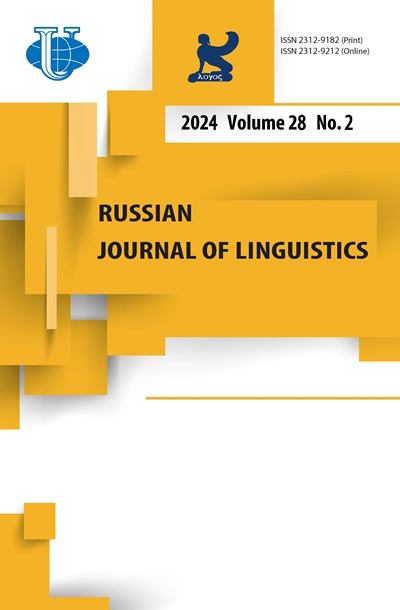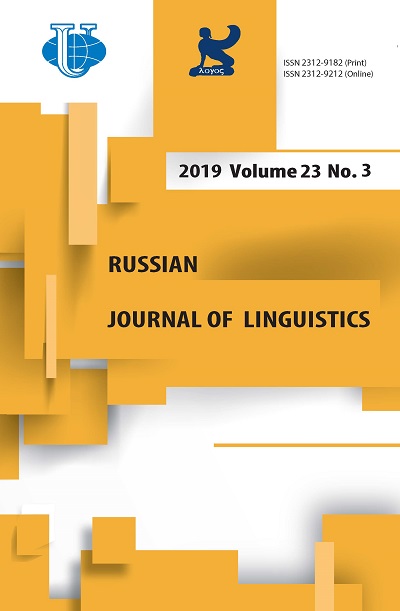Синтактика, когниция и композиционная семантика
- Авторы: Норман Б.Ю.1,2
-
Учреждения:
- Белорусский государственный университет
- Уральский федеральный университет
- Выпуск: Том 23, № 3 (2019)
- Страницы: 714-730
- Раздел: Статьи
- URL: https://journals.rudn.ru/linguistics/article/view/21778
- DOI: https://doi.org/10.22363/2312-9182-2019-23-3-714-730
Цитировать
Полный текст
Аннотация
Объектом статьи является семантика слова и ее реализация в ближайшем контексте. Цель и новаторский компонент исследования - анализ проблемы с точки зрения когнитивной лингвистики. Исходное положение: в лексическом значении слова есть составляющая, отвечающая за его вхождение в текст. Она включает в себя поиск лексических партнеров слова по синтагматической цепи. Участвующие в этом процессе семы актуализируются - они должны попасть в светлое поле сознания. Классическое проявление этой связи - так называемое семантическое согласование ( собака лает, бурый медведь, волосы дыбом и т.п.). На материале русской художественной литературы показано, что при образовании нетипичного (нестандартного) словосочетания происходит пересечение (смешение) концептов. Примеры типа самопишущий костюм или жаркая робость расширяют когнитивные горизонты человека, приучают его к иной (виртуальной) действительности. А в качестве фона и гаранта данного комбинаторного процесса выступает так называемый «здравый смысл», опирающийся на предшествующий опыт носителя языка. Результатом работы является выделение 5 особых ситуаций, воплощающих в себе отношения слова и его текстовых партнеров: это многозначные слова, фразеологические сочетания, наводящееся (привнесенное) значение, дополнительные коннотации и эффект неожиданности. Приводятся также примеры давления (влияния) текстовой памяти на говорящего в процессе выбора нужного слова, рассматривается идея предикативной природы сочетаемости лексем. Мотивируется появление особого направления в современном языкознании - композиционной семантики и демонстрируются (на материале русского языка) некоторые его результаты.
Ключевые слова
Об авторах
Борис Юстинович Норман
Белорусский государственный университет; Уральский федеральный университет
Автор, ответственный за переписку.
Email: boris.norman@gmail.com
доктор филологических наук, профессор, профессор кафедры теоретического и славянского языкознания Белорусского государственного универ- ситета (Минск). Сферы научных интересов: грамматика и лексика славянских языков, социо- лингвистика, психолингвистика, когнитивная лингвистика, лингводидактика. Основные (последние) научные публикации: «Основы психолингвистики» (Минск, 2011), «Когнитивный синтаксис русского языка» (Москва, 2013), «Новые занимательные задачи по русскому языку» (Минск, 2014), «Жизнь словоформы» (Москва, 2016), «Прагматический потенциал русской лексики и грамматики» (Москва - Екатеринбург, 2017).
пр. Независимости, 4, Минск, 220050, Беларусь; пр. Ленина, 51, Екатеринбург, 620000, РоссияСписок литературы
- Бирвиш М. Семантика // Новое в зарубежной лингвистике. Х. М.: Прогресс. С. 177-199. [Birvish, M. (1981). Semantika. Novoe v zarubezhnoi lingvistike. X. (Semantics). Moscow: Progress, 177-199 (In Russ.)]
- Влавацкая М.В. Окказиональная синтагматика в функционально-семантическом рассмотрении // Филологические науки. Вопросы теории и практики. Тамбов: Грамота, № 2 (32), Часть 1. С. 39-47. [Vlavatskaya, M.V. (2014). Okkazional'naya sintagmatika v funktsional'no-semanticheskom rassmotrenii. Filologicheskie nauki. Voprosy teorii i praktiki. (The occasional syntagmatics in the functional-semantic consideration). Tambov: Gramota, № 2 (32). Chast' 1, 39-47 (In Russ.)]
- Выготский Л.С. Мышление и речь // Выготский Л.С. Собрание сочинений. Т. 2: Проблемы общей психологии. М.: Педагогика. С. 5-361. [Vygotskii, L.S. (1982). Myshlenie i rech'. In Vygotskii L.S. Sobranie sochinenij. T. 2: Problemy obshchei psikhologii. (Thinking and speech). Moscow: Pedagogika, 5-361 (In Russ.)]
- Гак В.Г. К проблеме семантической синтагматики // Проблемы структурной лингвистики 1971. М.: Наука. С. 367-395. [Gak, V.G. (1972). K probleme semanticheskoi sintagmatiki. In Problemy strukturnoi lingvistiki 1971. (On the problem of semantic syntagmatics). Moscow: Nauka, 367-395 (In Russ.)]
- Гаспаров Б.М. Язык, память, образ. Лингвистика языкового существования. М.: Новое Литературное Обозрение. [Gasparov, B.M. (1966). Yazyk, pamyat', obraz. Lingvistika yazykovogo sushchestvovaniya. (Language, memory, image. Linguistics of language being). Moscow: Novoe Literaturnoe Obozrenie (In Russ.)]
- Караулов Ю.Н. Активная грамматика и ассоциативно-вербальная сеть. М.: ИРЯ РАН [Karaulov, Yu.N. (1999). Aktivnaya grammatika i assotsiativno-verbal'naya set'. (Active grammar, and associative-verbal network). Moscow: IRYa RAN (In Russ.)]
- Кечкеш И. Слово, контекст и коммуникативное значение. Вестник РУДН. Серия: Лингвистика. 2014. № 1. С. 7-18 [Kechkesh, I. (2014). Slovo, kontekst i kommunikativnoe znachenie (Word, Context and Communicative Meaning). Russian Journal of Linguistics, 7-18 (In Russ.)]
- Милославский И.Г. Вопросы словообразовательного синтеза. М.: Издательство Московского университета [Miloslavskii, I.G. (1980). Voprosy slovoobrazovatel'nogo sinteza. (Problems of word-formation synthesis). Moscow: Izdatel'stvo Moskovskogo universiteta (In Russ.)]
- Моррис Ч.У. Основания теории знаков // Семиотика. Сост. и ред. Ю.С. Степанова. М.: Радуга. С. 37-89. [Morris, Ch.U. (1983). Osnovaniya teorii znakov. In: Semiotika. Sost. i red. Yu.S. Stepanova. (The foundation of the theory of signs.). Moscow: Raduga, 37- 89 (In Russ.)]
- Никифорова Е.Б. Изменение сочетаемости лексем как показатель динамики семантической структуры слова // Слово - сознание - культура. Сб. научн. трудов. Сост. Л.Г. Золотых. М.: Флинта - Наука. С. 115-122. [Nikiforova, E.B. (2006). Izmenenie sochetaemosti leksem kak pokazatel' dinamiki semanticheskoi struktury slova. In Slovo - soznanie - kul'tura. Sb. nauchn. trudov. Sost. L. G. Zolotykh. (Changes in the compatibility of lexemes as an indicator of the dynamics of the semantic structure of the word). Moscow: Flinta - Nauka, 115-122 (In Russ.)]
- Норман Б.Ю. Когнитивный синтаксис русского языка. М.: Флинта - Наука [Norman, B.Yu. (2013). Kognitivnyi sintaksis russkogo yazyka. (The cognitive syntax of the Russian language). Moscow: Flinta - Nauka (In Russ.)]
- Рахилина Е.В. Когнитивный анализ предметных имен: семантика и сочетаемость. М.: Русские словари [Rakhilina, E.V. (2000). Kognitivnyi analiz predmetnykh imen: semantika i sochetaemost'. (Cognitive analysis of subject names: semantics and compatibility). Moscow: Russkie slovari (In Russ.)]
- Сепир Э. Язык. Введение в изучение речи // Сепир Э. Избранные труды по языкознанию и культурологии. М.: Прогресс - Универс. С. 26-203. [Sepir, E. (1993). Yazyk. Vvedenie v izuchenie rechi. In Sepir E. Izbrannye trudy po yazykoznaniyu i kul'turologii. (Language. An introduction to the study of speech). Moscow: Progress - Univers, 26-203 (In Russ.)]
- Стернин И.А. Лексическое значение слова в речи. Воронеж: Издательство Воронежского университета, 1985. [Sternin, I.A. (1985). Leksicheskoe znachenie slova v rechi. (Lexical meaning of the word in speech). Voronezh: Izdatel'stvo Voronezhskogo universiteta (In Russ.)]
- Харитончик З.А. В поисках сущности имен. Сб. научн. ст. Минск: МГЛУ, 2015. [Kharitonchik, Z.A. (2015). V poiskakh sushchnosti imen. Sb. nauchn. st. (Searching for names entity). Minsk: MGLU (In Russ.)]
- Aarts, Jan M.G., Calbert, Joseph P. (1979). Metaphor and Non-Metaphor. The Semantics of Adjective Noun Combination. Tübingen: Max Niemeyer Verlag.
- Allerton, D.J. (1990). Linguistically Strange Word Combinations. On Strangeness. Ed. by M. Bridges (Swiss Papers in English Language and Literature. 5). Tübingen: Günter Narr Verlag, 25-38.
- Asher, Nicholas (2011). Lexical Meaning in Context. A Web of Words. Cambridge University Press.
- Gadamer, Hans-Georg (1975). Warheit und Methode. Grundzüge einer philosophischen Methode. (Truth and Method. Basic motions of philosophical method). Tübingen: J.C.B. Mohr. (In Germ.).
- Jacobson, Pauline (2014). Compositional Semantics. An Introduction to the Syntax/Semantics. Oxford University Press.
- Jones, Steven, Paradis, Carita, Lynne Murphy, M., Willners, Caroline (2007). Googling for ʻopposites’: a web-based study of antonym canonicity. Corpora. Corpus-based Language Learning, Language Processing and Linguistics, 2 (2), 129-155.
- Pustejovsky, James (1996). The Generative Lexicon. 2th printing. Massachusetts: MIT Press.
- Sweetser, Eve (1999). Compositionality and blending: semantic composition in a cognitively realistic framework. Cognitive Linguistics: Foundations, Scope and Methodology. Ed. by T. Janssen, G. Redeker. Berlin - New York: Mouton de Gruyter. 129-162.
- Turula, Anna (2007). Modyfikujące innowacje frazeologiczne jako amalgamaty znaczeń w świetle modelu dynamicznego opartego na uzusie językowym. Frazeologia a językowe obrazy świata przełomu wieków. Red. naukowy W. Chlebda. Opole: Uniwersytet Opolski. 503-510. Словари и интернет-ресурсы / Dictionaries and Internet Resources
- БТСРЯ (1998): Большой толковый словарь русского языка. Глав. ред. С.А. Кузнецов. Санкт-Петербург: Норинт. [BTSRYa: Bol'shoi tolkovyi slovar' russkogo yazyka. Glav. red. S.A. Kuznetsov. (Large Explanatory Russian Dictionary). Saint-Petersburg: Norint (In Russ.)]
- Даль В.И. Толковый словарь живого великорусского языка. Т. I-IV. Изд. 4-е. Санкт-Петербург - Москва: Т-во Вольф. [Dal' V.I. (1912). Tolkovyi slovar' zhivogo velikorusskogo yazyka. T. I-IV. Izd. 4-e. (Explanatory dictionary of the living great Russian language). Saint-Petersburg - Moscow: T-vo Vol'f (In Russ.)].
- НКРЯ: Национальный корпус русского языка. URL: www.ruscorpora.ru [NKRYa: Natsional'nyi korpus russkogo yazyka (National corpus of the Russian language)]
- Словарь сочетаемости слов русского языка (1983) Под ред. П.Н. Денисова, В.В. Морковкина. Москва: Русский язык [Slovar' sochetaemosti slov russkogo yazyka. Pod red. P.N. Denisova, V.V. Morkovkina. (Dictionary of Russian words compatibility). Moscow: Russkii yazyk (In Russ.)]
- Современный русский язык. Социальная и функциональная дифференциация / отв. ред. Л.П. Крысин. М.: ЯСК, 2003. [Sovremennyi russkii yazyk. Sotsial'naya i funktsional'naya differentsiatsiya. Otv. red. L.P. Krysin. (Modern Russian language. Social and functional differentiation). Moscow: YaSK (In Russ.)]

















